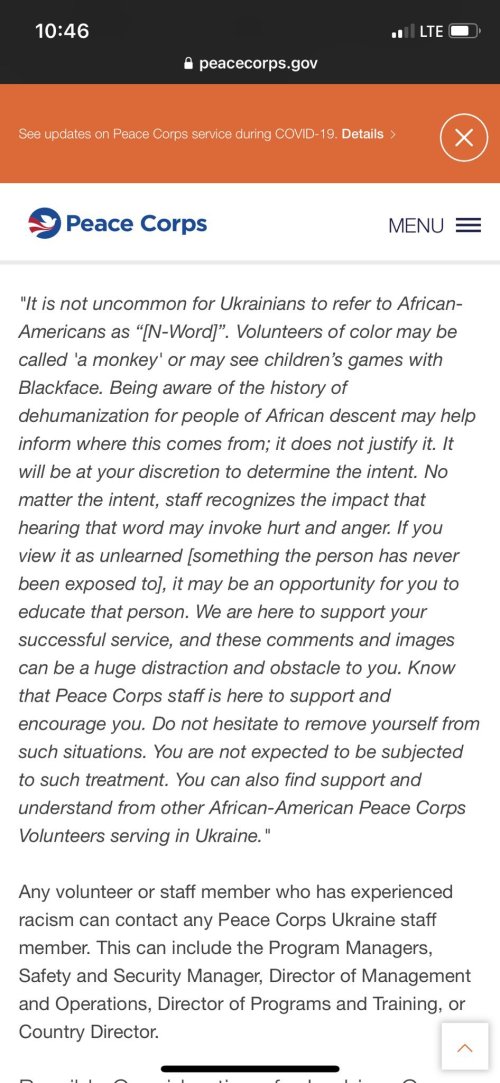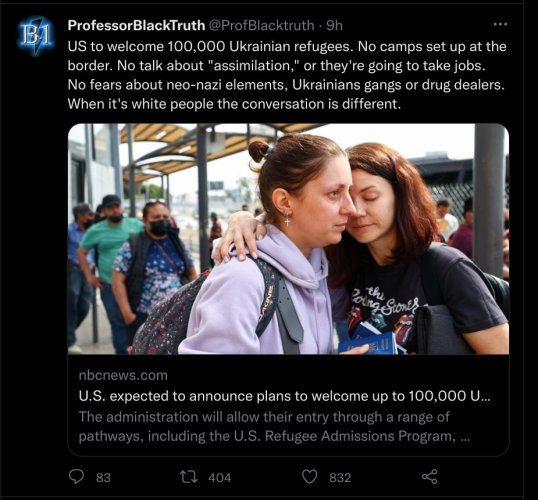WhipsAndChains
Sixer
Possible Considerations for African American or Black Volunteers visiting Ukraine
Volunteer Voices: “'People of color' face many challenges living in Ukraine, as a Peace Corps Volunteer. However, African-Americans will confront far more complicated issues. For modern parts of Ukraine, African-Americans are part of the community and day-to-day life. However, there are many Ukrainians who have never seen a Black person before. Their understanding of African-American culture is fueled by the media and African stereotypes. You will generate lots of interest and curious stares.
So, these stares can make you uncomfortable and annoyed. Ukrainians' initial perception of you may be that you are from Africa; it may not. It does help if they understand that you are an American, and the training in PST will help you consider ways that you will engage with these assumptions."
"It is not uncommon for Ukrainians to refer to African-Americans as “[N-Word]”. Volunteers of color may be called 'a monkey' or may see children’s games with Blackface. Being aware of the history of dehumanization for people of African descent may help inform where this comes from; it does not justify it.
It will be at your discretion to determine the intent. No matter the intent, staff recognizes the impact that hearing that word may invoke hurt and anger. If you view it as unlearned [something the person has never been exposed to], it may be an opportunity for you to educate that person. We are here to support your successful service, and these comments and images can be a huge distraction and obstacle to you.
Know that Peace Corps staff is here to support and encourage you. Do not hesitate to remove yourself from such situations. You are not expected to be subjected to such treatment. You can also find support and understand from other African-American Peace Corps Volunteers serving in Ukraine."
Any volunteer or staff member who has experienced racism can contact any Peace Corps Ukraine staff member. This can include the Program Managers, Safety and Security Manager, Director of Management and Operations, Director of Programs and Training, or Country Director.

Volunteer Voices: “'People of color' face many challenges living in Ukraine, as a Peace Corps Volunteer. However, African-Americans will confront far more complicated issues. For modern parts of Ukraine, African-Americans are part of the community and day-to-day life. However, there are many Ukrainians who have never seen a Black person before. Their understanding of African-American culture is fueled by the media and African stereotypes. You will generate lots of interest and curious stares.
So, these stares can make you uncomfortable and annoyed. Ukrainians' initial perception of you may be that you are from Africa; it may not. It does help if they understand that you are an American, and the training in PST will help you consider ways that you will engage with these assumptions."
"It is not uncommon for Ukrainians to refer to African-Americans as “[N-Word]”. Volunteers of color may be called 'a monkey' or may see children’s games with Blackface. Being aware of the history of dehumanization for people of African descent may help inform where this comes from; it does not justify it.
It will be at your discretion to determine the intent. No matter the intent, staff recognizes the impact that hearing that word may invoke hurt and anger. If you view it as unlearned [something the person has never been exposed to], it may be an opportunity for you to educate that person. We are here to support your successful service, and these comments and images can be a huge distraction and obstacle to you.
Know that Peace Corps staff is here to support and encourage you. Do not hesitate to remove yourself from such situations. You are not expected to be subjected to such treatment. You can also find support and understand from other African-American Peace Corps Volunteers serving in Ukraine."
Any volunteer or staff member who has experienced racism can contact any Peace Corps Ukraine staff member. This can include the Program Managers, Safety and Security Manager, Director of Management and Operations, Director of Programs and Training, or Country Director.






 For real.
For real.